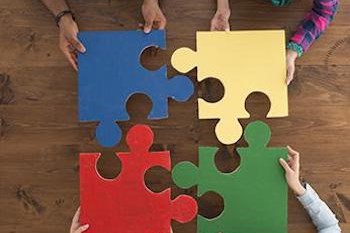
Lyn Wong | Today’s Manager | Singapore Institute of Management | Published on 01/03/2019
When leaders consciously shift to become more systems-inspired in the way they lead their teams, they adopt the practice of deep democracy with their teams.
Teams are the building blocks of all organisations. When the people in an organisation work effectively as a team, the organisation is more likely to perform well. The quality of the relationships that exists in the organisation provides the framework for high-performance. When an organisation has a high-performance culture, there is psychological safety, trust, rapport, mutual respect, and high degrees of collaboration and communication.
When two or more people come together, a relationship system or team entity is formed and the focus is no longer on the individuals but on the relationship as a system. It is not about “you” or “me”, it is about “us” and “we”. In a marriage, we focus on the relationship system rather than the agenda of the couple, to build a strong marriage. In a team, when we focus on the team entity, we are able to tap into the collective wisdom that exists in the team entity and optimise the team’s potential.
Human relationship systems are complex. Each relationship system has its own dynamics, ways of interaction, structures, and rules. What works well in one system may not work well in another. But when we intentionally interact with the dynamics of each relationship system, and relate to the relationship as a relationship system instead of a group of individuals, we gain access to new information and unleash the creative energy within the system. This enhances its interaction and optimises its wisdom and resources to develop strategies to tackle the complex environment the system operates in.
When leaders consciously shift to become more systems-inspired in the way they lead their teams, they are able to access and optimise the innate wisdom and potential in their teams. Leaders can start being more systems-inspired by adopting the practice of deep democracy with their teams.
Every member of a team entity is a voice of the system. Liken a team to a jigsaw puzzle where every piece of the puzzle forms part of the complete picture, every team member has a piece of critical information about the state of the team that needs to be heard, even the unpopular ones. When team members practise deep democracy, they keep an open mind and allow all voices to be expressed without judgement or fear of repercussions. They are curious about the positive intentions behind the words. They see value in the expression of different voices and view conflict and tension as a source of creative energy that is indicating something new is trying to happen. All team members are responsible for ensuring that all voices are shared openly without interruptions. Through all the voices heard, the team learns to tap on the collective wisdom within the team to make informed decisions leading to enhanced results and increased positivity.
The practice of deep democracy requires everyone in the team to engage in active and global listening. We spend most of our time listening to the voices in our head. How often do we find ourselves planning what we are going to say next instead of listening to the other person? When we interrupt someone to share our viewpoints, we are allowing our internal voices to be expressed instead of learning from and listening to that person. Through active listening, we are focussing on the other person and listening with the intent to understand. We are then able to build on their ideas by asking open-ended questions. Global listening is listening to what is not being said, what is hidden between the lines, body language, gestures, tone of voice, the emotions behind the words, and the mood of the team. Active listening and global listening require a lot of self-management, but when we engage in these listening skills and stay curious about what is being said and unsaid, we can gain new awareness and insights from the collective wisdom.
In the practice of deep democracy, we look for the two per cent truth in the words and communications of others. As mentioned earlier, conflict is a sign of something new trying to happen. When we stay curious and open-minded about opposing views or complaints and manage our impulses, we open the door to what is possible behind that two per cent truth. We get to look into the perspectives of the other person and engage in further dialogue which promotes deeper understanding. In this way, we allow for all voices of the system to be heard and tap into what the team entity is trying to express through each person, thereby harnessing the system’s collective wisdom.
When leaders relate to the team as a whole system instead of a group of individuals, they gain access to collective wisdom from the team entity, transform the team’s potential, and enhance team interactions. Together, they can effectively respond to complex challenges which lead to higher performance.
References
Rod A, Fridjhon M, 2016. Creating intelligent teams: leading with relationship systems intelligence, KR Publishing.
Fridjhon M, 2012. Systems oriented leadership competencies, CRR Global
Ms Lyn Wong, CPF, ACC, is a learning and organisation development practitioner. Through facilitation and coaching, she works with individuals, teams, and organisations to build a culture of collaboration and co-creation where people are aligned, engaged, and work together effectively to achieve strategic objectives.
Ms Wong is an Associate Trainer with SIM Professional Development and she conducts Mastering Personal Effectiveness & Emotional Competence.
through a structured training roadmap? Let us
help you with a curated L&D programme.

